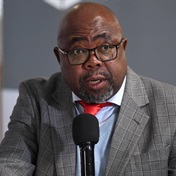
The Copyright Amendment Bill, which aims to update South Africa’s 40-year-old copyright law, is now with the parliamentary portfolio committee on trade and industry.
A number of communities have a stake in the final amendment.
Lloyd Gedye looks at how musicians, academics and the visually impaired will be affected
So heated has lobbying over the Copyright Amendment Bill become that musicians have accused members of the Copyright Review Commission (CRC) of receiving payments from the SA Music Rights Organisation (Samro) or its affiliates.
The commission chaired by retired Judge Ian Farlam was established by Trade and Industry Minister Rob Davies in 2010, following a presidential conference on the creative industries the previous year.
In correspondence City Press has seen from copyright lawyer Graeme Gilfillan to the parliamentary portfolio committee, he writes that the allegation of payments to commission members surfaced during a Samro strike in 2013.
Gilfillan claims the commission members were retained or paid as consultants or, in some other capacity, before, during or after the CRC process.
Although both the trade and industry department and Samro dismiss the allegation, there are a number of music industry players who want the department to investigate it.
HOW THE BILL AFFECTS MUSICIANS
Critics argue that the Farlam report ignored submissions and interviews, with one saying the “outcomes were predetermined”.
The public allegations prompted Davies to issue a statement in April saying he was satisfied with the commission’s findings, that the process was “open, transparent and credible” and he would encourage Parliament to rely on the report.
“If there are substantiated allegations against members of the CRC, there are legal processes those who allege wrongdoing can follow,” he said.
Davies said that commission members were in private practice and might have consulted on copyright to collecting societies at some stage. He said he had “seen no evidence” to support the allegations against the commission’s process.
Davies insisted the commission report was “critical” of abuses within collecting societies and that, if the commission was corrupted, “it’s not likely they would have been so harsh”.
In response to questions, Samro chief executive Nothando Migogo said any money received by commission members from Samro or its affiliates would have been royalty payments for their published works.
Samro has been rocked by various royalty scandals.
In April City Press revealed a 55-year-old royalty scam affecting local musicians. Award-winning gospel powerhouse Hlengiwe Mhlaba alleged that R8.5 million of her royalties were stolen in 10 years.
Her lawyer, Gilfillan, discovered she was just one of many affected artists, said to include Rebecca Malope, Thomas Chauke, Jabu Khanyile, Benjamin Dube, Mbongeni Ngema, Brenda Fassie, Miriam Makeba and Mahlathini.
Music industry players insist the Copyright Amendment Bill will reinforce the agendas of the collective management organisations in South Africa, allowing the “bad behaviour” to continue.
Gilfillan argued that as long as the collecting societies’ royalty databases are privately held, transparency will suffer.
Andrew Rens, a former Shuttleworth Foundation fellow on copyright, said there are a number of South African musicians who are not properly paid and that lawyers and auditors are needed – not just new legislation.
“There should be law enforcement action to audit these collecting societies,” he said, adding that laws are only as good as their enforcement.
The trade and industry department has long maintained that the main impetus behind the Copyright Amendment Bill was to ensure that musicians are compensated for their songs.
Davies said there are “some good things” in the bill and that artists would have a “better deal than they have ever had”.
But a number of musicians and their representatives believe the bill will not address their plight.
Gilfillan has accused the department of lying to Parliament, taking issue with claims that the bill would not “correct long-standing loopholes”. Davies denies Gilfillan’s claims.
Tebogo Sithathu, the president of the Musicians Association of SA and chairperson of the Gospel Music Association, argues that the bill is “unfit for purpose” because it doesn’t address data as a key form of currency in the consumption of content worldwide and is silent on online contracts.
“What we need is a bill that is clear on digital rights management, not just a mere mention of it,” Sithathu said. Gilfillan agrees, arguing that the bill makes only one mention of digital rights in the preamble.
HOW THE BILL AFFECTS ACADEMICS
You are a university student and need access to an article written by a South African academic, funded with a research grant from the public purse.
But to access it, your university has to pay an annual subscription to the publisher of the journal that carried the article.
When you add these subscriptions up across the country’s universities, it amounts to hundreds of millions of rands paid to publishers each year for content they didn’t pay to produce.
Some of the content publishers that demanded subscriptions to access articles were funded with taxpayers’ money.
Key stakeholders insist that universities pay more than they should and about 80% of the subscription fees leave the country, paid to international publishers.
There are six large international academic journal publishers. A single article can cost about $35 (R524) to access; an annual journal subscription can cost $500.
The costs, however, are usually hidden behind nondisclosure agreements that universities have to sign.
In the late 1990s these global academic publishers began offering “big deals” to the world’s universities, allowing them to access a vast amount of content at discounted prices.
But the universities argue that above-inflation annual increases in costs in the past 20 years have made these deals unaffordable.
Universities and library consortiums around the world are now fighting back, pushing for an open-access option, allowing academics to make their papers available for free.
They argue for a “publish-and-read model”, which combines publishing articles as open access and reading pay-walled articles into one fee, which they claim would halve their costs.
But not all open-access models are equal. And one particular area of concern is hybrid journals, described as a “lose-lose” model for universities and a “win-win” for publishers who want to be paid twice.
This is because the university is charged an expensive article-processing cost to publish the article and then charged to access it once published.
South African academics City Press spoke to all said the bill would deliver a far better deal for universities.
But not all are happy with it.
Monica Seeber, founder of the Academic and Non-Fiction Authors’ Association of SA, established to promote and protect the intellectual property rights of its members and academic and non-fiction authors, said the copyright law already contains exceptions to copyright for education and libraries.
She said if the bill is promulgated, it will severely affect the book publishing industry which is heavily dependent on educational books.
“The end result for authors will be fewer outlets for their works and less income. Authors already earn hardly anything,” she said, adding authors writing in indigenous languages will be hardest hit.
“Their readership and market is tiny and their only real outlet is for education,” she said. “If the bill is passed into law in its current form schools and universities will be enabled to freely make and distribute copies, rather than buy books.”
Another issue is the effect copyright law has on the archiving process. Wits Librarian Denise Nicholson said the delays in the Copyright Amendment Bill process are holding back the digitisation of the country’s archives.
“We can’t digitise without permission,” she said. “It’s holding back heritage work.”
Nicholson said at Wits they can’t even convert old film to digital without permission, but the new bill with fair use included would allow that.
The International Council on Archives secretary-general Anthea Seles wrote to the department’s parliamentary portfolio committee in May, cautioning the government to resist pressure from rights holders to limit fair-use clauses in the bill.
Seles argued that fair-use clauses enable archives, libraries and museums to share their materials with the public and are “essential” to encourage the creation of new works.
THE VISUALLY IMPAIRED
One group badly affected by 40 years of South African copyright law are the visually impaired, a community of between 570 000 and 1.2 million citizens, said Blind SA chief executive Jace Nair.
This is because the 1978 Copyright Act did not include any exceptions for the conversion of books to blind-accessible formats.
The blind have been lobbying publishers and rights holders for decades to resolve this problem, with no success.
And, although it was hoped that the Marrakesh Treaty adopted in 2013 would provide some relief, the trade and industry department has refused to ratify it until the copyright law is amended.
“We argued that they should not link the two, but department was insistent,” Nair said.
He said the delays are incredibly limiting and as soon as South Africa ratifies the treaty, the visually impaired will be able to access tens of thousands of books already produced by countries that have ratified it.
If the blind are denied access to information and knowledge, it limits their progress in life, keeping them in poverty or economically dependent.
Davies said the government supports the Marrakesh Treaty, but an international treaty needs domesticating.
Nair said in the developed world only about 5% of published works are made available in blind-accessible formats; in developing countries this is as low as half a percent.
He said most books converted into blind-friendly formats are done not by publishers or rights holders but by NGOs who need permission to covert them, which can take from three months to two years.
Also, most of these books are in English, with a few in Afrikaans and very few in African languages.
Blind SA is active in producing books for schools, the education department, universities and national departments. Nair said they “essentially purchase a copy of the book and rewrite it electronically”.
Two proofreaders – one sighted and one blind – edit it. It can take six weeks to convert a 300-page book and cost R24 000 to produce just one master copy and up to R1 800 for each subsequent copy.
Nair said the draft of the Copyright Amendment Act states that if publishers do not make a book available in a blind-accessible format on the same day at the same price, organisations like Blind SA can reproduce the books without infringing copyright.
The bill allows for a cross-border exchange, meaning that Nelson Mandela’s Long Walk to Freedom, which Blind SA published in braille, can be shared with other African countries.
Nair said the Harry Potter series was converted into English braille by eight African countries as they couldn’t share.
“All that could have been done once by one country,” he said.




 Publications
Publications
 Partners
Partners








